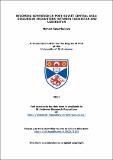Files in this item
Becoming sovereign in post-Soviet Central Asia : 'discursive encounters' between Tajikistan and Uzbekistan
Item metadata
| dc.contributor.advisor | Cummings, Sally N. | |
| dc.contributor.author | Suyarkulova, Mohira | |
| dc.coverage.spatial | 265 | en_US |
| dc.date.accessioned | 2012-09-27T09:18:44Z | |
| dc.date.available | 2012-09-27T09:18:44Z | |
| dc.date.issued | 2011-11 | |
| dc.identifier | uk.bl.ethos.558099 | |
| dc.identifier.uri | https://hdl.handle.net/10023/3159 | |
| dc.description.abstract | In 1991 republics of Soviet Central Asia were reluctantly ‘launched’ into independence. The central puzzle of this dissertation is: “How has sovereign statehood been ‘constructed’ in the post-independence period in the absence of history of anti-colonial struggle?” This is an analysis of state sovereignty as a practice that is performative and interactive through the examination of ‘discursive encounters’ between Tajikistan and Uzbekistan. Such analysis traces temporal and spatial dimensions of dialogical sovereign identity construction. In post-Soviet Tajikistan and Uzbekistan sovereignties have been performed in a dialogue, through dynamic interactions with one another. The work of asserting state sovereignty is performed by various actors who claim to impersonate the state and speak on its behalf. Multiple narratives of the self are articulated in relation to the relevant “interlocutor”, whose reactions and counter-articulations are “fed back” into the narrative of the self. The right to existence of these states as agents of international relations is justified through such ‘discursive encounters’ that simulate sovereignty. I propose the Möbius strip as a conceptual model for understanding the process of sovereignty-assertion. Competing historiographies present two irreconcilable narratives: history of an ethnic group and history of the territory of the current state. These are consistent with the nature of nationalisms in each state. While Tajik nationalists long for ‘historical Tajikistan’, Uzbek nationalism is inherently conservative and defensive of territorial sovereignty. The controversy surrounding the Roghun HPP is an example of the daily construction and maintenance of a state. Competing principles of water sharing contributed to an ongoing crisis in Tajik-Uzbek relations. Sovereignty is simulated within the periods and zones of ‘exception’ via a Möbian mechanism of dialogical meaning-making, whereby each side strives to exploit the inherent ambiguity of signifiers in order to advance their own narrative of the self and other. | en_US |
| dc.language.iso | en | en_US |
| dc.publisher | University of St Andrews | |
| dc.subject.lcc | DK859.56S8 | |
| dc.subject.lcsh | Asia, Central--Politics and government--1991- | en_US |
| dc.subject.lcsh | Sovereignty--Tajikistan | en_US |
| dc.subject.lcsh | Sovereignty--Uzbekistan | en_US |
| dc.subject.lcsh | Nationalism--Tajikistan | en_US |
| dc.subject.lcsh | Nationalism--Uzbekistan | en_US |
| dc.subject.lcsh | Tajikistan--Foreign relations--Uzbekistan | en_US |
| dc.subject.lcsh | Tajikistan--Foreign relations--Uzbekistan | en_US |
| dc.title | Becoming sovereign in post-Soviet Central Asia : 'discursive encounters' between Tajikistan and Uzbekistan | en_US |
| dc.type | Thesis | en_US |
| dc.type.qualificationlevel | Doctoral | en_US |
| dc.type.qualificationname | PhD Doctor of Philosophy | en_US |
| dc.publisher.institution | The University of St Andrews | en_US |
This item appears in the following Collection(s)
Items in the St Andrews Research Repository are protected by copyright, with all rights reserved, unless otherwise indicated.

